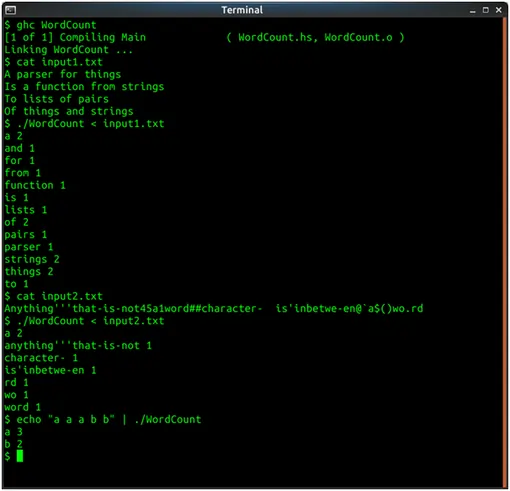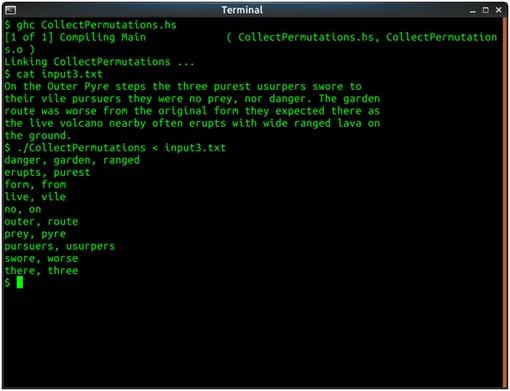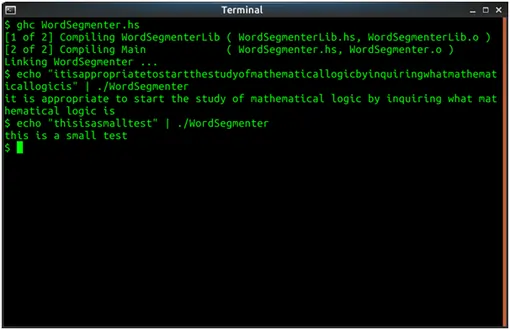Instructions
Objective
Write a haskell assignment program to count words in file, and find words that are anagrams.
Requirements and Specifications
Counting Words
In this assignment you will produce a sorted word count from input text. The input will be a text stream as in the rot13 program and you will output a list of words with their associated counts such that the words are sorted (String is in typeclass Ord and so that ordering is acceptable) and all in lower-case. E.g. the text:
A parser for things Is a function from strings To lists of pairs Of things and strings should output:
- a 2
- and 1
- for 1
- from 1
- function 1
- is 1
- lists 1
- of 2
- pairs 1
- parser 1
- strings 2
- things 2
- to 1
Implement this as a program with the exact name WordCount.hs such that it can be run as ./WordCount like the rot13 program. It should be in the assignment4 directory of your repository.
A word is defined as a contiguous sequence of letters with the quote character '\'' and the dash character '-'. That means "dog's" and "about-face" are each considered one word. Note that '\'':[] == "'".
Screenshots of output



Source Code
Word count
module Main where
import Data.Char
import Data.List
import qualified Data.Map.Strict as Map
-- Get a map with all the words found and the counts for each one
getWordCounts :: String -> Map.Map String Int
getWordCounts xs = getFreqs (map toLower xs) []
where
getFreqs [] [] = Map.empty
getFreqs [] ys = Map.singleton ys 1
getFreqs (x:xs) ys =
if (not (isAlpha x)) && x /= '\'' && x /= '-' then
if null ys then
getFreqs xs []
else
Map.unionsWith (+) [Map.singleton ys 1, getFreqs xs []]
else
getFreqs xs (ys ++ [x])
-- Gets an input string and returns the text showing the word counts
getWordCountsStr :: String -> String
getWordCountsStr xs = (intercalate "\n" (map entryToStr (Map.toAscList (getWordCounts xs)))) ++ "\n"
where
--converts a map entry to a string "k v"
entryToStr (xs,n) = xs ++ " " ++ (show n)
main :: IO ()
main = interact getWordCountsStr
Collector permutation
module Main where
import Data.Char
import Data.List
import qualified Data.Map.Strict as Map
import Control.Category
-- Get a map with all the words found and the counts for each one
getWordCounts :: String -> Map.Map String Int
getWordCounts xs = getFreqs (map toLower xs) []
where
getFreqs [] [] = Map.empty
getFreqs [] ys = Map.singleton ys 1
getFreqs (x:xs) ys =
if (not (isAlpha x)) && x /= '\'' && x /= '-' then
if null ys then
getFreqs xs []
else
Map.unionsWith (+) [Map.singleton ys 1, getFreqs xs []]
else
getFreqs xs (ys ++ [x])
-- Determines is a pair of strings are permutations of each other
isPermutation :: String -> String -> Bool
isPermutation [] [] = True
isPermutation _ [] = False
isPermutation [] _ = False
isPermutation (x:xs) ys = case span (/= x) ys of
(hs, []) -> False
(hs, ts) -> isPermutation xs (hs ++ (tail ts))
-- Makes groups of permutations for a given list of words with same lengths
groupPermutations :: [String] -> [[String]]
groupPermutations [] = []
groupPermutations [_] = [] -- ignore single permutations
groupPermutations (x:xs) =
case partition (isPermutation x) (x:xs) of -- get all permutations
([_],zs) -> groupPermutations zs -- no permutations of x
(ys, zs) -> ys : (groupPermutations zs)
collectPermutations :: String -> String
collectPermutations xs =
getWordCounts >>> Map.keys >>> -- get the list of words
filter lenGT1 >>> -- remove single letter words
sortOn length >>> -- sort by length
(groupBy eqLen) >>> -- group by same lengths
(filter lenGT1) >>> -- remove lists that have only one word
(foldr (\x y -> (groupPermutations x) ++ y) []) >>> -- group by permutations and flatten list
(map listToStr) >>> -- Convert each sublist to a string line
sort >>> -- sort line strings
intercalate "\n" >>> -- separate lines by newlines
(++ "\n") $ xs -- append ending newline
where
eqLen xs ys = length xs == length ys
lenGT1 xs = length xs > 1
listToStr xs = intercalate ", " xs
main :: IO ()
main = interact collectPermutations
Related Samples
Explore our collection of free Haskell samples to discover elegant functional programming solutions. Whether you're new to Haskell or seeking advanced techniques, our samples offer insightful code snippets to elevate your understanding and development skills. Start exploring today!
Haskell
Haskell
Haskell
Haskell
Haskell
Haskell
Haskell
Haskell
Haskell
Haskell
Haskell
Haskell
Haskell
Haskell
Haskell
Haskell
Haskell
Haskell
Haskell
Haskell
